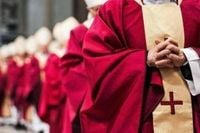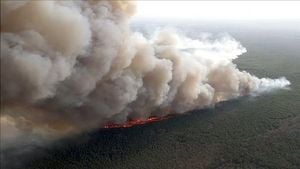As the world watches closely, the potential successors to Pope Francis are taking shape, with a list of at least 22 cardinals emerging as frontrunners for the papacy. This list, highlighted by the Collegeofcardinalsreport.com, reveals a diverse group of individuals from various continents, each bringing unique backgrounds and perspectives to the table.
Among the most notable candidates is Cardinal Fridolin Ambongo Besungu, who was born on January 24, 1960, in Boto, Democratic Republic of Congo. Ambongo, a member of the Friars Minor Capuchins, has a rich educational background, having studied philosophy and moral theology. He was ordained a priest in 1988 and has held several significant positions within the Church, including archbishop of Kinshasa and president of the Symposium of Episcopal Conferences of Africa and Madagascar (SECAM).
Ambongo is known for his strong stance against neocolonialism and for advocating social justice in Congo. His commitment to human dignity and environmental issues resonates with many, making him a compelling candidate for the papacy. He has been vocal about the need for the Church to address contemporary issues while maintaining its moral teachings.
Another key figure is Cardinal Anders Arborelius, who serves as the Bishop of Stockholm. Born on September 24, 1949, in Sorengo, Switzerland, Arborelius converted to Catholicism at the age of 20. His journey to the cardinalate began when he was appointed Bishop of Stockholm in 1998, making him the first Swedish cardinal. Known for his gentle demeanor and commitment to interfaith dialogue, Arborelius has been a strong advocate for the Church's teachings while also promoting inclusivity.
Cardinal Jean-Marc Aveline, the Archbishop of Marseille, is also seen as a favorite for the papacy. Born in Algeria on December 26, 1958, Aveline has dedicated his ministry to promoting dialogue among different faiths and advocating for migrants. His recent election as president of the French Episcopal Conference reflects his growing influence within the Church.
On the Italian front, Cardinal Pietro Parolin, the Vatican Secretary of State, is a prominent contender. At 70 years old, Parolin has been a key figure in Vatican diplomacy, particularly noted for his role in the historic agreement between the Holy See and China regarding bishop appointments. His extensive experience in international relations positions him as a strong candidate for the papacy.
Cardinal Matteo Maria Zuppi, the Archbishop of Bologna, is another Italian candidate who has garnered attention. At 69 years old, Zuppi is known for his compassionate approach to social issues and his commitment to peace initiatives, particularly in Ukraine. As the president of the Italian Episcopal Conference, he has been a vocal advocate for marginalized communities.
Other notable candidates include Cardinal Luis Antonio Tagle from the Philippines, who is recognized for his charisma and advocacy for the poor; Cardinal Charles Maung Bo from Myanmar, who has been a voice for peace and reconciliation in his country; and Cardinal Timothy Dolan from the United States, known for his conservative stance on various issues.
In addition to these names, the list of potential papal candidates includes Cardinal Raymond Leo Burke, a prominent figure in canon law; Cardinal Willelm Jakobus Eijk from the Netherlands, who has a strong background in medical ethics; and Cardinal Mario Grech from Malta, who serves as the Secretary General of the Synod of Bishops.
As discussions about the future of the papacy intensify, the characteristics and beliefs of these candidates will play a crucial role in shaping the direction of the Catholic Church. The next conclave will not only determine who will lead the Church but also signal the values and priorities that will define its future.
With the diverse backgrounds and perspectives of these candidates, the potential for a new direction in the papacy is palpable. Will the next pope prioritize social justice and interfaith dialogue, or will he uphold traditional teachings in the face of modern challenges? As the world awaits the outcome, one thing is clear: the future of the Catholic Church is poised for significant change.




